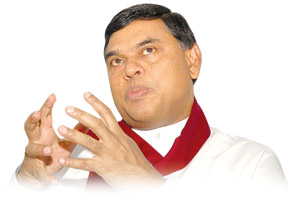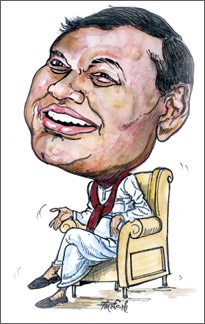|
Minister Basil Rajapaksa stresses:
Constitutional reforms, development should go hand in hand
By Dhaneshi YATAWARA
 Economic Development Minister Basil Rajapaksa strongly believes that
this is the time to serve the people instead of making them to through
nerve-racking experience. With the 18th Amendment to the Constitution
coming to the top of the list of current topics and the national
development drive on an accelerated pace requiring equal attention, the
Minister today tackles an array of high profile issues. Economic Development Minister Basil Rajapaksa strongly believes that
this is the time to serve the people instead of making them to through
nerve-racking experience. With the 18th Amendment to the Constitution
coming to the top of the list of current topics and the national
development drive on an accelerated pace requiring equal attention, the
Minister today tackles an array of high profile issues.
“The proposed 18th Amendment suggests imposing pressure on the
President of the country, when elected for the second term, to work in
the same pace as the first,” Minister Rajapaksa said. “If the President
decides to contest for the third time, which is solely a party decision,
he or she must work effectively for the people if he/she wishes to go in
front of the people and ask for their mandate,” he said. In an interview
with the Sunday Observer, Minister Rajapaksa talked about serving the
people more, not only through development measures, but also by making
crucial changes in the Sri Lankan political structure.
Q: How do you see the proposed 18th Amendment to the
Constitution? How will this affect the stability of the country?
A: President Mahinda Rajapaksa received a huge mandate from
the people in 2010 being re-elected as the President of the country. A
few months later, the people gave the same response in electing
Parliamentarians to represent them in the Legislature. The United
People’s Freedom Alliance received a kind of mandate from the people
which no other party has ever received. With two large mandates given by
the people, it’s time for the President and the Parliament to deliver
what they promised. We must also find new ways to serve the people at a
more accelerated pace in rebuilding our nation. For that the
Constitution, which lays opportunities and chances for a politician to
work, should be stable.
 Q: Why did the Government suggest the 18th Amendment? Were the
provisions in the existing Constitution inadequate to serve the people? Q: Why did the Government suggest the 18th Amendment? Were the
provisions in the existing Constitution inadequate to serve the people?
A: Especially when it comes to serving the people who elected
their President, there are barriers. The Constitution in section 92 C
describes the selection criteria of the President being re-elected for
the second- term is a barrier. Losing at the presidential election twice
and appearing for the third time is accepted, but the one whom the
people re-elected becomes disqualified. This is highly questionable. How
can the person whom the people preferred could get disqualified? This is
the main reason for Presidents of Sri Lanka to display declined
performance in their second tenure. They are barred from coming before
the people for a third time.
If the people are not satisfied with the President’s performance
during the second tenure, they will decide firmly on re-electing the
President. In the middle of this second tenure, even if the people start
to think of a new character for the next presidency, the existing
president can silently manage his or her survival. If the President can
serve for a third time, he or she may take more interest in serving the
people as he or she has to appear in front of the people again for their
verdict. This change of thinking, among the President and the people,
according to the provisions of the present constitution, brings the
Government to a shaky position.
Q: Many point out that this Amendment is proposed to extend
the period of the Presidency?
A: This Amendment will never extend the period of Presidency.
It will remain only for six years. If the President wishes to contest
for the third time, he/she will have to face the people’s verdict.
People will judge him or her by the service rendered. The sovereignty of
the country lies with the people.
The Constitution firmly says that the executive power of the people
including the defence of Sri Lanka will be exercised by the President of
the Republic. What we suggest is the removal of a barrier imposed on the
President to appear for an election for the third time. Other criteria
mentioned in the Constitution for a person to face an election are
acceptable. A person facing bribery charges or any other crime being
disqualified from contesting for the Presidency is acceptable. However,
a person already selected twice by the people is also disqualified under
the present Constitution. How can these two conditions be treated on an
equal level?
Q: How confident are you of receiving a two-third majority for
the Amendment in Parliament?
A: During President J.R. Jayewardene’s time starting from
1977, the period during which the present Constitution came into being,
the then Government was able to achieve only about 50.9 percent at an
average on referendums. So, it is not easy. The Constitution is written
in such a way that the proportional representation system makes it
difficult even to get a simple majority. During the parliamentary
elections 2010, we received 146 seats, that was just four seats less to
achieve the two-third majority. I’m confident that the Government’s
proposal for this crucial change will be accepted.
Q: There were long-term discussions on abolishing the
Executive Presidency and changing the Constitution as a whole. Amidst
these, why did the Government forward a proposal for a Constitutional
Amendment?
A: A constitutional change cannot be done in a hurry. Many
rounds of discussions need to take place between every segment. It is
much more complicated. And, on top of everything the Government has to
go for a referendum to change the Constitution. The Government has to
prepare in the same manner for an election if we are going for a
referendum. So, it is almost an election. The people have faced several
elections within a short span of time. Another election prior to its
scheduled time would surely hamper the stability of the country.
 Actually, the people gave a clear mandate, irrespective of the
discussion on the present Constitution, to the Government to represent
them. The people have not demanded a change in the Constitution. What
the people want is our service. That should be delivered without delay.
The people’s representatives must work now. Instead of changing the
Constitution, any government can decide on amendments that may arise due
to timely requirements. Actually, the people gave a clear mandate, irrespective of the
discussion on the present Constitution, to the Government to represent
them. The people have not demanded a change in the Constitution. What
the people want is our service. That should be delivered without delay.
The people’s representatives must work now. Instead of changing the
Constitution, any government can decide on amendments that may arise due
to timely requirements.
Opposition
Q: There is rising disagreement from the Opposition for the
Constitutional Amendment? What is your comment?
A: I can say that the United National Party betrayed us. They
were in discussions with us from the very beginning and at the last
moment they let down the parties agreeing to the Constitutional
Amendment.
They changed their mind at the last moment. During the discussions 80
percent of them were in agreement. This is the usual habit of the UNP.
Even with the 1972 Constitution, the UNP raised a minor technical point
in the discussions and objected to it.
Even during Chandrika Kumaratunga’s regime the UNP acted in the same
manner. They were with us, discussing and agreeing, and suddenly they
changed their stance. What I understand is that many UNPers like to
support the Amendment. Unfortunately certain forces in the party are
blocking this. But in my experience, every time the UNP took such a
decision, they suffered the consequences.
Q: You repeatedly mentioned that whatever amendments or
changes should be towards strengthening the Government to serve the
people. What are the priorities of the Government in national
development?
A: Development must be achieved in all sectors. It cannot be
confined to one ministry. Agriculture, investment promotion, road
development, power generation and other subjects all matter. Our main
areas are agriculture, services and industrial sectors.
We have to develop our human resources. We may need to outsource our
knowledge base-human resources. Sri Lanka is located in a very
centralized place in the sea and air transport routes. This is another
area we specially focus on developing. We also emphasise on the rural
economy and the estate sector as 80 percent of the population live in
one of these two areas.
Development is something the public should feel. It should not be
something that benefits only a few rich people or families. It cannot be
confined to one city or district. So, depending on the resources and
requirements development should be distributed among all villages. The
Government’s priority under the Mahinda Chinthana is to develop all
villages in all 25 districts. Every citizen should be catered to
equally.
If development does not reach the people, that will be a reason for a
country to collapse. We have a very Sri Lankan model for development. We
are tapping every possible resource.
Q: What was the rationale for creating the Economic
Development Ministry by amalgamating several ministries?
A: When we observe the path taken by countries which have
succeeded on the economic front, we can see that they have concentrated
every possible option on economic development during economic crisis.
Japan is the best example. They faced a crisis soon after World War II,
but with this concept, then succeeded. We must understand that economic
development is not for one ministry. We are carrying out more of a
facilitating role.
But we have especifically taken tourism under our ministry and that
is a considerable task.
We work closely with the Finance Ministry and the Central Bank - that
is why we have the same secretary to the Finance and Economic
Development Ministries.
In this effort, we have achieved many of the targets we have planned
initially. Now it is time we start receiving the benefits from the
development projects already started. |

